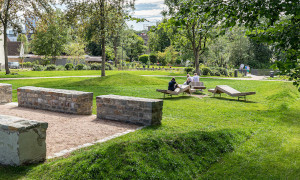How conflicts between the expansion of renewable energies on the one hand and landscape and nature conservation on the other can be avoided was the topic of a public expert discussion in the Bundestag's Committee on the Environment, Nature Conservation and Nuclear Safety on Wednesday, 24 February 2021. In the meeting chaired by committee chair Sylvia Kotting-Uhl (Bündnis 90/Die Grünen), the majority of the invited experts were in favour of making greater use of the potential of wind power and photovoltaics. On the other hand, the use of bioenergy and hydropower was viewed critically.
Christina von Haaren from the Institute for Environmental Planning at Leibniz University in Hanover presented a model that calculates how much renewable energy can be generated in Germany without polluting sensitive areas. The result shows that it is possible to cover the estimated energy demand in 2040 in an environmentally friendly way with wind power and photovoltaics on all suitable roofs alone, said von Haaren. This does not take into account cultivated biomass, as this requires a large amount of land. The model also does not take into account photovoltaics on open spaces. The expert suggested formulating a national energy target and then breaking this down to the individual communities. In this way, it would be possible to remove obstacles to acceptance.
Bernd Hansjürgens of the Helmholtz Centre for Environmental Research pointed out the fundamental problem of land. He said that land was coming under increasing pressure from agriculture and other uses. Therefore, it is necessary to design an energy transition that takes up as little land as possible. From this point of view, bioenergy has only limited potential. As hydropower is also critical, the possibilities of photovoltaics and wind energy must be exploited. He sees great opportunities for photovoltaics in the landscape and for wind energy on forest areas, the expert explained.
The expansion of renewable energies makes a contribution to climate protection, and this is the prerequisite for nature conservation, stressed Paul Lehmann from the Faculty of Economics at the University of Leipzig. He suggested that animal species should be protected as populations rather than as individuals. The Federal Nature Conservation Act stipulates that individual animals may not be killed because of infrastructure measures, Lehmann explained; however, it allows for exceptions. The expert therefore suggested defining "density centres" in which no wind turbines could be erected. Conversely, exceptions to the individual killing ban would then be permissible in all other areas.
Source: hib - heute im bundestag No. 236/2021
- Latitude: 0
- Longitude: 0


